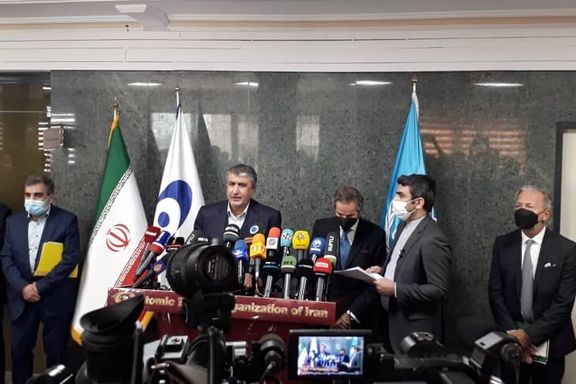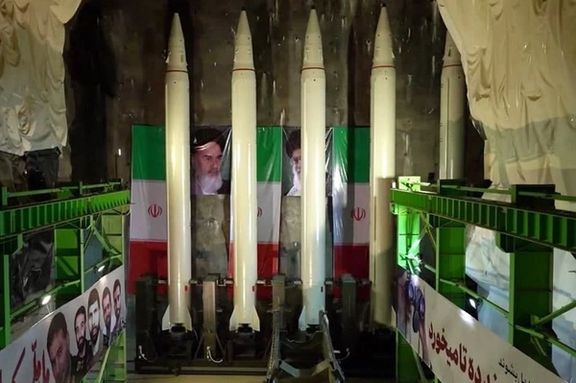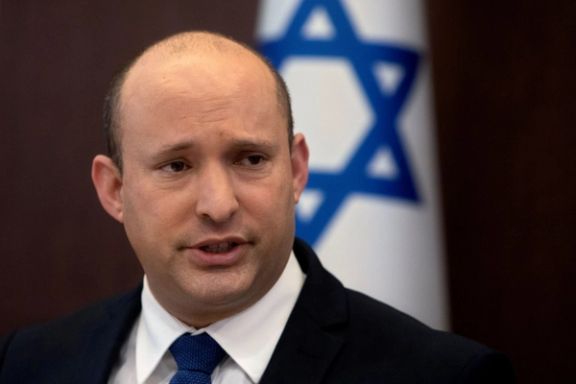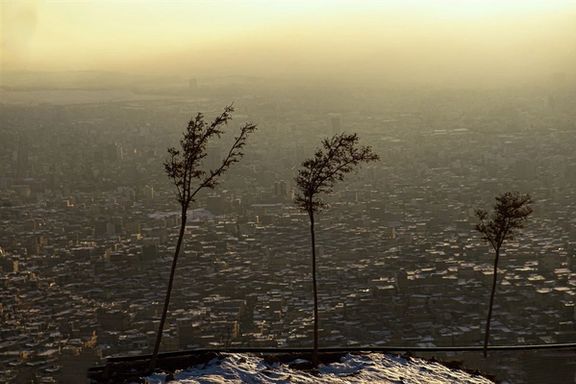Israeli Minister Says Iran Will Get Nukes In Five Years, 'Tops'

Israeli Finance Minister Avigdor Lieberman has said: "With or without an agreement, Iran will be a nuclear state and have a nuclear weapon within five years, tops."

Israeli Finance Minister Avigdor Lieberman has said: "With or without an agreement, Iran will be a nuclear state and have a nuclear weapon within five years, tops."
Lieberman was speaking at a security conference on Tuesday where Prime Minister Naftali Bennett said Iran is at the most advanced stage of acquiring nuclear weapons and Israel reserves the right to confront Tehran, with or without a nuclear agreement.
Israel, itself widely believed to have nuclear weapons, has long argued that the 2015 deal was too weak to prevent Iran from pursuing a bomb. Former US President Donald Trump abandoned the deal in 2018, describing it as too soft, and Iran responded by violating some of the deal's restrictions. President Joe Biden's administration aims to revive it.
Israel has also complained that the nuclear agreement does nothing to rein in Iran's ballistic missile program, or hostile activity by Iranian-backed militia.
"The Iranians have encircled the State of Israel with missiles while they sit safely in Tehran," Bennett said. "To chase the terrorist du jour sent by the (Iranian covert) Qods Force does not pay off anymore. We must go for the dispatcher."
Speaking separately, the chief of Israel's air force offered cooperation with Gulf Arab partners against Iranian-made attack drones, a rare public airing of the possibility of joint operations.

In a press conference with UN's Rafael Grossi in Tehran, Iran's nuclear chief claimed that Grossi "emphasized there is no deviation" in Iran's nuclear program.
Mohammad Eslami said the IAEA chief in their meeting Tuesday had "emphasized repeatedly that no deviation has been observed in Iran's nuclear program".
Government controlled media in Iran immediately began tweeting Eslami's assertion that Grossi admitted there was no deviation in Iran's nuclear program.
Eslami also told reporters that the questions raised by the IAEA regarding the "documents provided to the agency by Iran's enemies" have been answered partly and it was agreed in their meeting to resolve the remaining cases.
Eslami also claimed that the IAEA will not be influenced by "Iran's enemies' insidious infiltration".
Grossi who was listening to a translation of Eslami’s remarks did not directly respond to his assertions.
"The agency is seeking to continue and deepen the dialogue with the government of Iran..., We agreed to continue our joint work on transparency, and this will continue, UN nuclear watchdog chief Rafael Grossi told his televised news conference Tuesday.
Grossi who arrived in Tehran Monday evening has previously criticized as inadequate explanations given by Iran over traces of uranium found at two undeclared sites and relating to work carried out before 2003.
But it is still not clear what was decided over IAEA's complaints about Iran limiting access to its monitoring work in its nuclear installations, which was an important aspect of Grossi's visit.
The IAEA chief will also hold talks with Hossein Amir-Abdollahian Tuesday afternoon for the first time since his appointment as foreign minister.
In the joint press conference, Eslami also stressed that Iran requires generation of at least 10,000 MW of electricity by nuclear technology and is adamant about its nuclear program.
The official news agency IRNA said in a report Tuesday before the press conference, that the IAEA chief and Eslami would discuss "the establishment of a clear framework for cooperation between the UN nuclear watchdog and Iran's Atomic Energy Organization.
The IAEA has issued critical reports saying Tehran has not fully cooperated with its monitors, which could make it more difficult to revive the 2015 nuclear agreement known as JCPOA, under which Iran accepted curbs on its nuclear program in return for the lifting of international sanctions.
According to IAEA reports last week, Iran had still not granted IAEA inspectors access it promised two months ago to re-install monitoring cameras at a workshop that was the site of apparent sabotage in June.
The meeting with the IAEA chief is taking place ahead of an IAEA Board of Governors' meeting this week and days before resumption of talks in Vienna to revive the 2015 nuclear deal, Joint Comprehensive Plan of Action (JCPOA) which US President Donald Trump unilaterally withdrew from in 2018, imposing draconian sanctions on Iran.
Western powers scrapped plans in September for an IAEA board resolution rebuking Iran, after Tehran agreed to prolong monitoring of some nuclear activities and invited IAEA chief Rafael Grossi to Tehran for talks. Grossi is again due in Tehran ahead of the IAEA board meeting.

Saudi Arabia said on Tuesday it had destroyed a ballistic missile launch site in overnight air strikes in the Houthi-controlled capital Sanaa, where residents reported big explosions.
A broadcaster run by the Iran-aligned Houthi movement, Al Masirah TV, said three air strikes by the Saudi-led coalition had hit a residential district of the capital.
There were no immediate reports of casualties.
In a statement reported by the Saudi state news agency (SPA) on Twitter, the coalition said air strikes had been conducted against "legitimate military targets" in Sanaa.
It described the ballistic missile sites as "secret" and said one of "high-value" had been destroyed.
The coalition said that "the secret positions" had used hospitals, organizations and civilians as human shields.
Residents told Reuters the explosions had rocked the northern neighborhoods of the city, and said two military sites had been attacked.
The Houthis have repeatedly launched cross-border attacks on Saudi Arabia using drones and missiles since the Saudi-led coalition intervened in Yemen in March 2015 after the movement ousted the Saudi-backed government from the capital.
The Houthi movement said on Saturday it had fired 14 drones at several Saudi cities, including at Saudi Aramco facilities in Jeddah.
The conflict is widely seen as a proxy war between Saudi Arabia and Iran.
Reuters Report

Israel’s defense minister Benny Gantz accused Iran on Tuesday of carrying out drone attacks on maritime targets from bases in Chabahar port and Qeshm island.
Gantz also said that these sites were also used to store combat drones.
Iran’s military drone program has expanded in recent years and UAV’s have been more frequently used in recent months both on land and at sea.
Separately, the chief of Israel's air force proposed working with Arab partners - such as the United Arab Emirates and Bahrain, with which Israel formalized ties last year - against the drone threat.
Iran has been accused of attacking tankers in the Persian Gulf region since 2019 when several vessels were hit by what was described as limpet mines. Iranian naval forces have also seized tankers, most recently in late October, when they forced a Vietnamese-flagged tanker into Iranian waters.
Gantz made the allegation, which he described as a first public disclosure, during a televised speech at a security conference hosted by Reichman University.
Chabahar is a port city on the Sea of Oman near Pakistan from where Iranian forces can project power into the Indian Ocean and to the shores of Oman. Frequent naval drills take place in the region.

Israel’s Naftali Bennett signaled readiness on Tuesday to step up confrontation with Iran and said Israel would not be bound by any new Iranian nuclear deal.
Bennett’s tough statements come after the Biden Administration in recent weeks has kept in close touch with Israel and its Arab neighbors in the region trying to reduce concerns over its policy of seeking a diplomatic agreement with Iran.
Indirect negotiations will begin on November 29 about reviving the 2015 deal, which former US President Donald Trump withdrew from, deeming it insufficient to shut down projects with bomb-making potential - a view shared by the Israelis and Saudi Arabia.
Iran, which denies seeking nuclear arms, has since the US walkout breached the deal with expanded uranium enrichment, stockpiling more than 200 kilograms of 20-percent and 60-percent enriched uranium. This has brought Iran very close to obtaining the 90-percent enriched fissile material for making a bomb.
Bennett, who took power in June, described Iran in a speech as being at "the most advanced stage of its nuclear program".
While his government has previously said it would be open to a new nuclear deal with tougher restrictions on Iran, Bennett reasserted Israel's autonomy to take action against its arch-foe.
“The mistake we made after the first nuclear deal in 2015 will not repeat itself,” said Bennett. “With all the noise beforehand, from the moment the deal was signed, it affected us like a sleeping pill. Israel simply fell asleep on duty. We occupied ourselves with other things.”
“We will learn from this mistake,” he said. “We will maintain our freedom of action.”
"We face complicated times. It is possible that there will be disputes with the best of our friends," he told a televised conference hosted by Reichman University.
"In any event, even if there is a return to a deal, Israel is of course not a party to the deal and Israel is not obligated by the deal."
A long New York Times piece Sunday reportedconcern among United States intelligence officials over past and possible future Israeli attacks on Iran’s nuclear program. Since July 2020, several major sabotage attacks, widely attributed to Israel, have hit Iran’s sensitive nuclear facilities.
Bennett voiced frustration with what he described as Israel's smaller-scale clashes with Iranian guerrilla allies.
"The Iranians have encircled the State of Israel with missiles while they sit safely in Tehran," he said. "To chase the terrorist du jour sent by the (Iranian covert) Qods Force does not pay off anymore. We must go for the dispatcher."
Stopping short of explicitly threatening war, Bennett said cyber-technologies and what he deemed Israel's advantages as a democracy and international support could be brought to bear.
"Iran is much more vulnerable than is commonly thought," he said.
With reporting by Reuters, Times of Israel

Air pollution in Iran’s major cities has reached dangerous levels this week as power plants have switched from scarce natural gas to dirty fuels in colder weather.
Javad Rahmati, deputy governor of Eastern Azarbaijan province said the provincial capital Tabriz is enveloped in smug because from late summer power plants were ordered to switch from natural gas to mazut, a heavy diesel fuel banned in most of the world.
This week, Tehran, Esfahan, Mashhad and Arak reported heavy pollution and people at higher risk were advised to stay indoors.
Iran has the second largest gas reserves in the world but because of lack of investment and advanced technologies it is unable to produce more than what it extracts now, which is around 700-750 million cubic meters a day. Domestic usage has climbed to 530 million cubic meters a day officials announced this week, leaving little for industries and export.
Iran has the world’s cheapest energy prices in par with Venezuela, which is the main factor in high consumption, while various sanctions have made it difficult to upgrade its oil and gas industries or to adopt more alternative fuels.